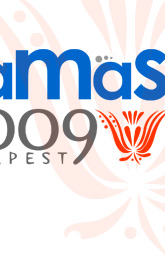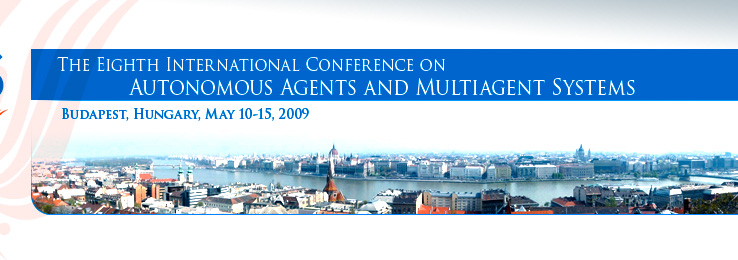Nominations must be made no later than:
December 16, 2008.
*********************************************************************
2009 IFAAMAS Award for Influential Papers in Agents and Multiagent Systems
The International Foundation for Autonomous Agents and Multi-Agent Systems has established an award to recognize publications that have made influential and long-lasting contributions to the field. Candidates for this award are papers that have proved a key result, led to the development of a new subfield, demonstrated a significant new application or system, or simply presented a new way of thinking about a topic that has proved influential. A list of previous winners of this award is appended below.
This award is presented annually at the AAMAS Conference, in this case AAMAS-09 in Budapest in May. Winning papers must have been published at least 10 years before the award presentation, therefore this year's eligible set comprises papers published in 1999 or earlier, in any recognized forum (journal, conference, workshop).
To nominate a publication for this award, please send the full reference plus a brief statement (150 words or fewer) about the significance of the paper to Michael Wellman (chair of the 2009 award cmte),
wellman@umich.edu.
Nominations are due by
4 February 2009.
2009 Influential Paper Award Committee: Michael Wellman (chair), Sarit Kraus, Hideyuki Nakashima, Milind Tambe
Previous Award Winners
2008
BRATMAN, M. E., ISRAEL, D. J. & POLLACK, M. E. (1988) Plans and resource-bounded practical reasoning. Computational Intelligence, 4, 349-355.
DURFEE, E. H. & LESSER, V. R. (1991) Partial global planning: A coordination framework for distributed hypothesis formation. IEEE Transactions on Systems, Man, and Cybernetics, 21, 1167-1183.
2007
GROSZ, B. J. & KRAUS, S. (1996) Collaborative plans for complex group action. Artificial Intelligence, 86, 269-357.
RAO, A. S. & GEORGEFF, M. P. (1991) Modeling rational agents within a BDI-architecture. Second International Conference on Principles of Knowledge Representation and Reasoning.
ROSENSCHEIN, J. S. & GENESERETH, M. R. (1985) Deals among rational agents. Ninth International Joint Conference on Artificial Intelligence.
2006
COHEN, P. R. & LEVESQUE, H. J. (1990) Intention is choice with commitment. Artificial Intelligence, 42, 213-261.
DAVIS, R. & SMITH, R. G. (1983) Negotiation as a metaphor for distributed problem solving. Artificial Intelligence, 20, 63-109.
******************************************************************************
IFAAMAS-08 Victor Lesser Distinguished Dissertation Award
Ariel Procaccia receives the 2008 Victor Lesser Distinguished Dissertation Award sponsored by IFAAMAS, the International Foundation for Autonomous Agents and Multiagent Systems (
http://www.ifaamas.org).
The selection committee for the IFAAMAS-08 Victor Lesser Distinguished Dissertation Award is pleased to announce that Dr. Ariel Procaccia has won the award. Dr. Procaccia received the Ph.D. in Computer Science from Hebrew University of Jerusalem. His thesis contains fundamental contributions to computational social choice theory, covering a wide variety of topics including the complexity of election manipulation, the robustness of voting rules, the learnability of voting rules, and incentive-compatible machine learning. Among other contributions, it introduces a new way of analyzing the manipulability of social choice functions, which has become influential in AAMAS and related research communities.
The committee is also pleased to announce two runners-up: Dr. Matthew Taylor, who received his Ph.D. in Computer Science from the University of Texas at Austin, and Dr. Yevgeniy Vorobeychik, who received his Ph.D. in Computer Science and Engineering from the University of Michigan. Dr. Taylor's thesis concerns transfer learning and Dr. Vorobeychik's thesis studies empirical mechanism design. Both dissertations also make innovative and influential contributions to the field of autonomous agents and multiagent systems.
Previous winners of this award were Radu Jurca (2007) and Vincent Conitzer (2006).
The selection committee members were Vincent Conitzer, Les Gasser, Radu Jurca, Sarit Kraus, Sandip Sen, and Makoto Yokoo (chair).



